Keeping Wipes out of Pipes

Bailey-Alexander Complex
1501 W Samford Ave
-
(334) 501-3060 -
webwtrswr@auburnal.gov -
- M-F
- 7:30AM-4:30PM
-
\t\t\t\t{{SocialMediaLinks}} \t\t\t \t\t
Despite what a package might say, so-called "flushable" wipes should never actually be flushed.
While they might go down the drain, they don't break down properly and can cause serious blockages in our sewer system. That leads to costly repairs and dangerous overflows. Think before you flush!
Why do flushable wipes cause problems?
Toilet paper is designed to disintegrate quickly in water, but flushable wipes are made from strong, non-biodegradable materials that don't break down in sewer systems. Instead, when they're flushed, these wipes:
-
Clog household plumbing.
- Wipes get caught in pipes and lead to slow drains or full blockages that require costly plumbing repairs.
-
Create sewer blockages.
-
When wipes end up in public sewer lines, they combine with fats, oils and grease (FOG), forming massive, rock-like wads that block pipes and lead to raw sewage overflows.
- Side note, you also can keep fats, oils and grease out of our system by participating in the FOG Recycling Program!
-
When wipes end up in public sewer lines, they combine with fats, oils and grease (FOG), forming massive, rock-like wads that block pipes and lead to raw sewage overflows.
-
Overburden treatment plants.
- Wipes that make it through the sewer system clog our pumps and screens, leading to costly repairs and substantial downtime of critical components of our treatment system.
The Cost of Convenience
Sewer authorities across the country, including the City of Auburn's Sewer Division, have seen firsthand the damage flushable wipes cause. Blockages and overflows can result in:
- Environmental hazards.
- Health risks.
- Expensive emergency repairs, which ultimately get passed on to customers in rate fees.
What can I do?
The solution is simple: only flush toilet paper! Even if the package says "flushable," dispose of wipes in the trash instead. This small change will protect your plumbing, prevent sewer backups and keep treatment costs lower for the entire community.

